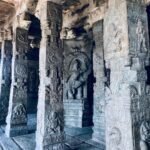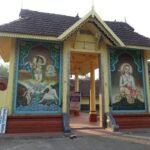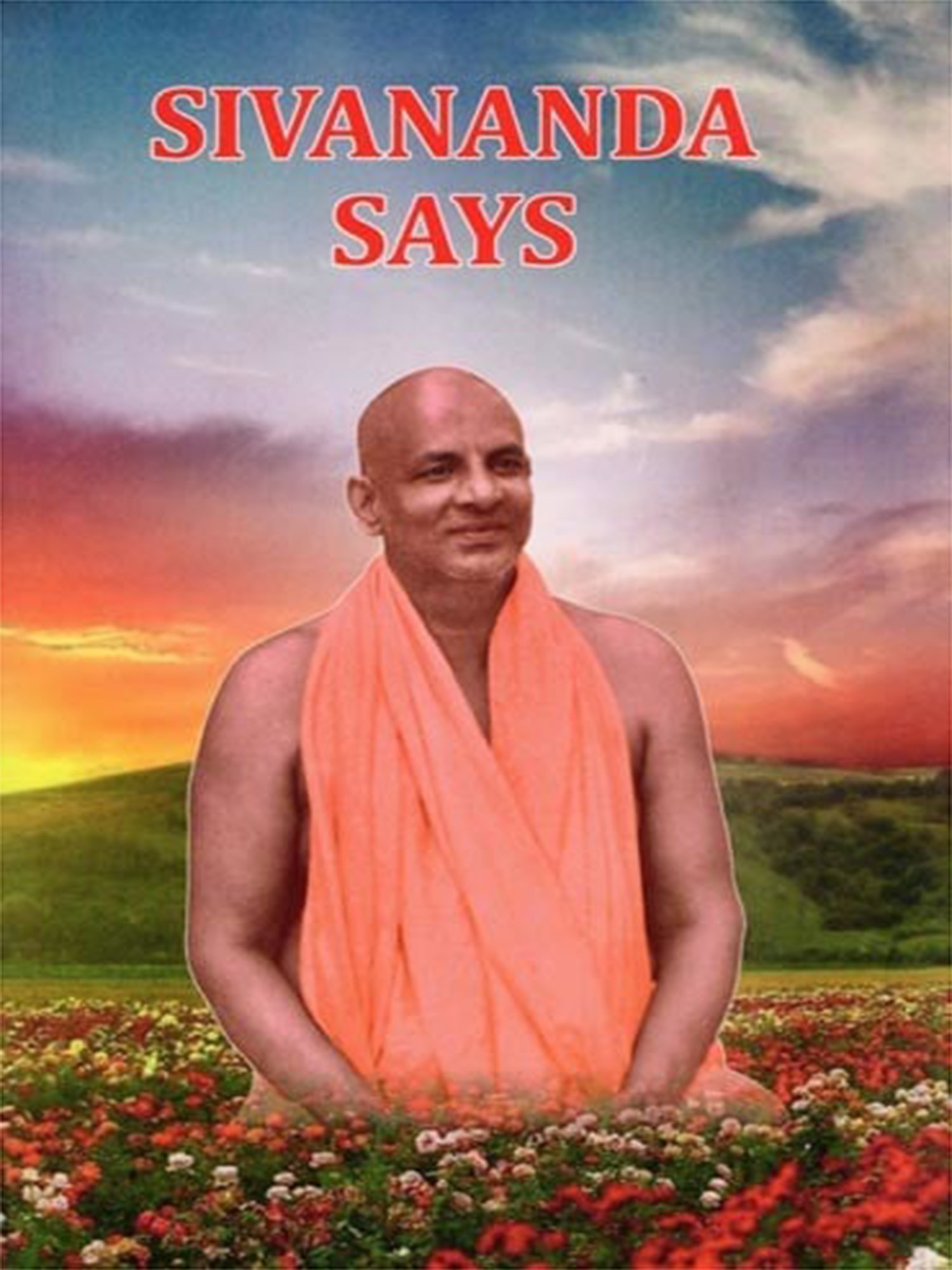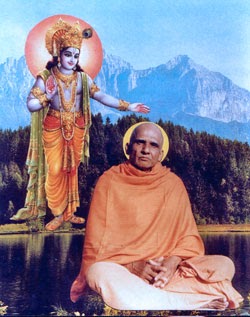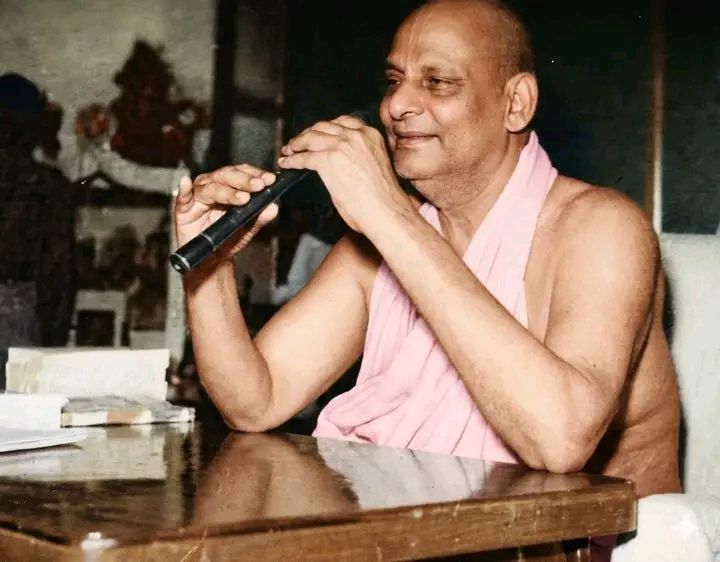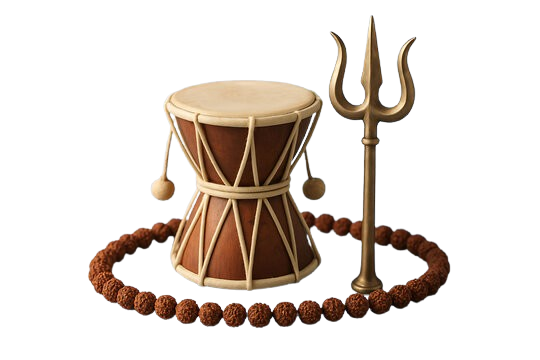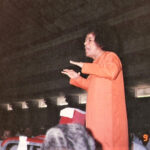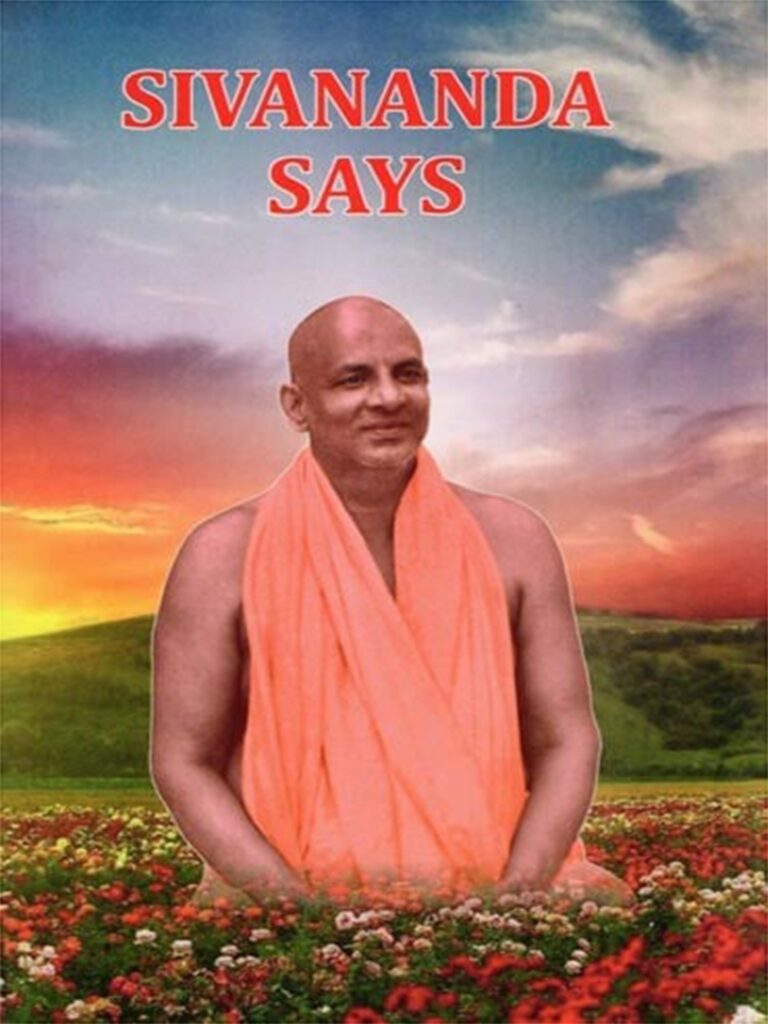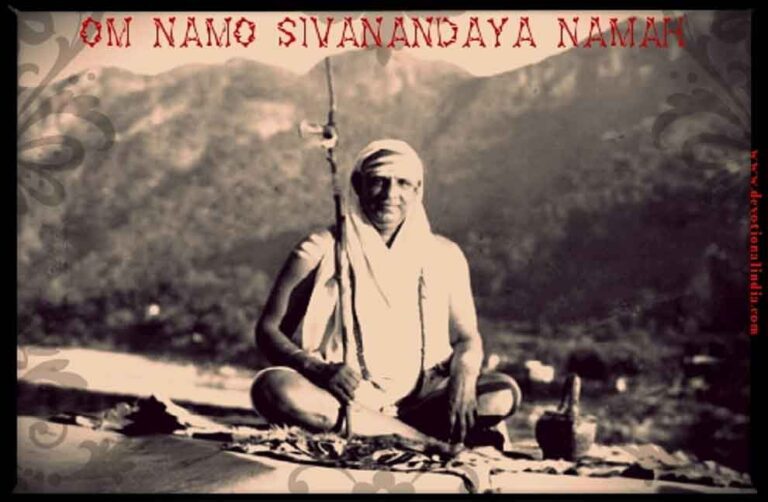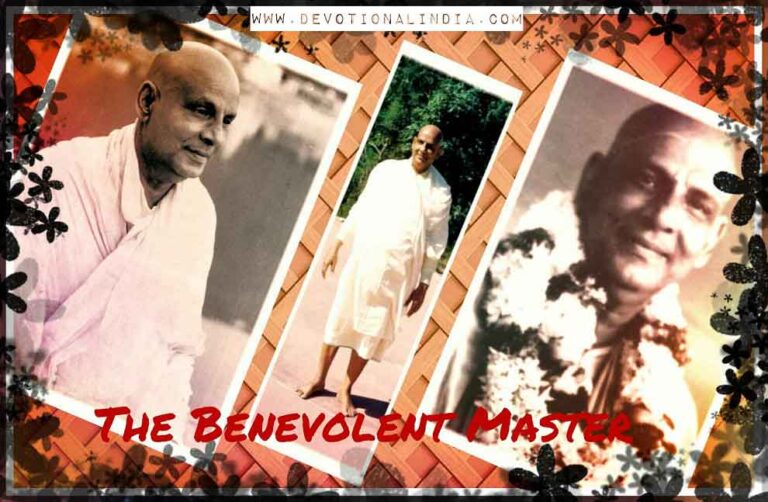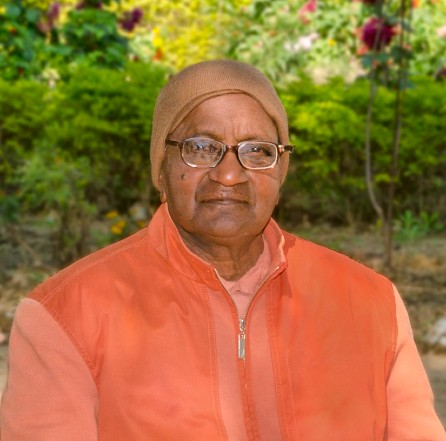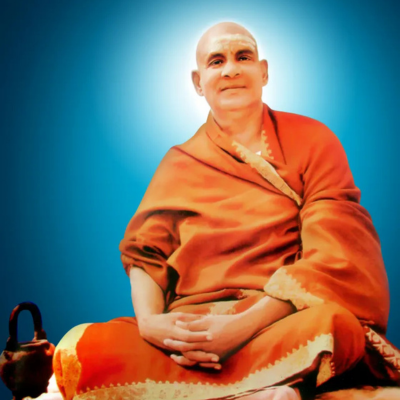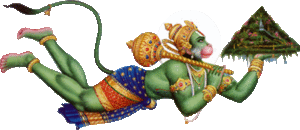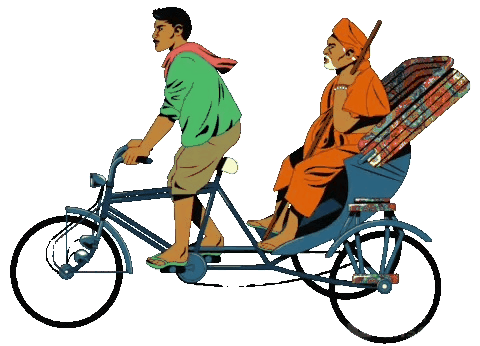Read Bhagavad Gita Chapter Eighteen New
Chapter 18
Moksha Sanyaas Yoga
The eighteenth chapter of the Bhagavad Gita is “Moksha Sanyas Yoga”. Arjuna requests the Lord to explain the difference between the two types of renunciations – sanyaas(renunciation of actions) and tyaag(renunciation of desires). Krishna explains that a sanyaasi is one who abandons family and society in order to practise spiritual discipline whereas a tyaagi is one who performs their duties without attachment to the rewards of their actions and dedicating them to the God. Krishna recommends the second kind of renunciation – tyaag. Krishna then gives a detailed analysis of the effects of the three modes of material nature. He declares that the highest path of spirituality is pure, unconditional loving service unto the Supreme Divine Personality, Krishna. If we always remember Him, keep chanting His name and dedicate all our actions unto Him, take refuge in Him and make Him our Supreme goal, then by His grace, we will surely overcome all obstacles and difficulties and be freed from this cycle of birth and death.

Bhagavad Gita 18.1
अर्जुन उवाच संन्यासस्य महाबाहो तत्त्वमिच्छामि वेदितुम्। त्यागस्य च हृषीकेश पृथक्केशिनिषूदन।।18.1।।
arjuna uvācha sannyāsasya mahā-bāho tattvam ichchhāmi veditum tyāgasya cha hṛiṣhīkeśha pṛithak keśhi-niṣhūdana
arjunaḥ uvācha—Arjun said; sanyāsasya—of renunciation of actions; mahā-bāho—mighty-armed one; tattvam—the truth; ichchhāmi—I wish; veditum—to understand; tyāgasya—of renunciation of desires for enjoying the fruits of actions; cha—and; hṛiṣhīkeśha—Krishna, the Lord of the senses; pṛithak—distinctively; keśhī-niṣhūdana—Krishna, the killer of the Keshi demon
Translation
Arjuna said, “O mighty-armed Hrishikesa, I desire to know the essence or truth of renunciation and abandonment severally, O slayer of Kesi.”
Commentary
18.1 संन्यासस्य of renunciation? महाबाहो O mightyarmed? तत्त्वम् the essence of truth? इच्छामि (I) wish? वेदितुम् to know? त्यागस्य of Tyaga or abandonment? च and? हृषीकेशः O Krishna? पृथक् severally? केशिनिषूदन् slayer of Kesi.Commentary The teaching of the whole of the GitaSastra is summed up beautifully in this discourse. This last discourse is a brief masterly summary of all that is told in
the previous chapters. Arjuna wishes to know the distinction between Sannyasa and Tyaga.Kesi was an Asura whom Lord Krishna slew. So Lord Krishna is addressed as Kesinishudana by Arjuna.The words Sannyasa and Tyaga have been used here and there in the preceding discourses but their connotations are not lucidly distinguished. Therefore Lord Krishna clearly explains to Arjuna the right significance of the two terms in the following verse.

Bhagavad Gita 18.2
श्री भगवानुवाच काम्यानां कर्मणां न्यासं संन्यासं कवयो विदुः। सर्वकर्मफलत्यागं प्राहुस्त्यागं विचक्षणाः।।18.2।।
śhrī-bhagavān uvācha kāmyānāṁ karmaṇāṁ nyāsaṁ sannyāsaṁ kavayo viduḥ sarva-karma-phala-tyāgaṁ prāhus tyāgaṁ vichakṣhaṇāḥ
śhrī-bhagavān uvācha—the Supreme Divine Personality said; kāmyānām—desireful; karmaṇām—of actions; nyāsam—giving up; sanyāsam—renunciation of actions; kavayaḥ—the learned; viduḥ—to understand; sarva—all; karma-phala—fruits of actions; tyāgam—renunciation of desires for enjoying the fruits of actions; prāhuḥ—declare; tyāgam—renunciation of desires for enjoying the fruits of actions; vichakṣhaṇāḥ—the wise
Translation
The Blessed Lord said, “The sages understand sannyasa to be the renunciation of action with desire; the wise declare the abandonment of the fruits of all actions to be tyaga.”
Commentary
English Commentary By Swami Sivananda
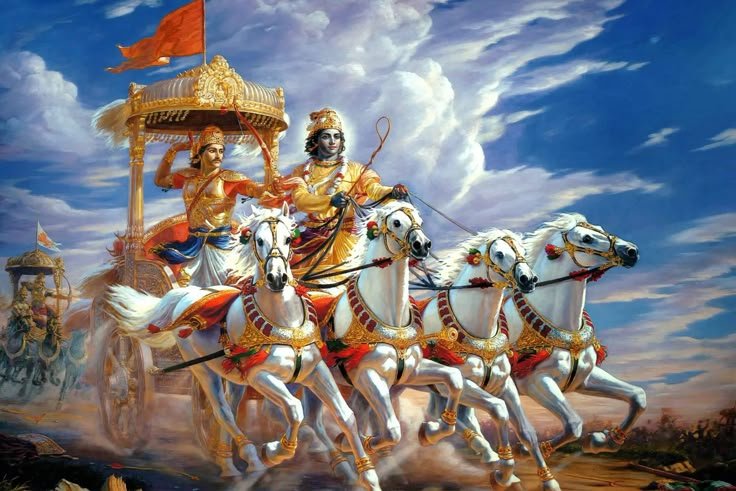

Bhagavad Gita 1.3
पश्यैतां पाण्डुपुत्राणामाचार्य महतीं चमूम्। व्यूढां द्रुपदपुत्रेण तव शिष्येण धीमता।।1.3।।
paśhyaitāṁ pāṇḍu-putrāṇām āchārya mahatīṁ chamūm vyūḍhāṁ drupada-putreṇa tava śhiṣhyeṇa dhīmatā
paśhya—behold; etām—this; pāṇḍu-putrāṇām—of the sons of Pandu; āchārya—respected teacher; mahatīm—mighty; chamūm—army; vyūḍhām—arrayed in a military formation; drupada-putreṇa—son of Drupad, Dhrishtadyumna; tava—by your; śhiṣhyeṇa—disciple; dhī-matā—intelligent
Translation
Behold, O Teacher! This mighty army of the sons of Pandu, arrayed by the son of Drupada, thy wise disciple.
Commentary
1.3 पश्य behold? एताम् this? पाण्डुपुत्राणाम् of the sons of Pandu? आचार्य O Teacher? महतीम् great? चमूम् army? व्यूढाम् arrayed? द्रुपदपुत्रेण son of Drupada? तव शिष्येण by your disciple? धीमता wise.No Commentary.

Bhagavad Gita 1.4
अत्र शूरा महेष्वासा भीमार्जुनसमा युधि। युयुधानो विराटश्च द्रुपदश्च महारथः।।1.4।।
atra śhūrā maheṣhvāsā bhīmārjuna-samā yudhi yuyudhāno virāṭaśhcha drupadaśhcha mahā-rathaḥ
atra—here; śhūrāḥ—powerful warriors; mahā-iṣhu-āsāḥ—great bowmen; bhīma-arjuna-samāḥ—equal to Bheem and Arjun; yudhi—in military prowess; yuyudhānaḥ—Yuyudhan; virāṭaḥ—Virat; cha—and; drupadaḥ—Drupad; cha—also; mahā-rathaḥ—warriors who could single handedly match the strength of ten thousand ordinary warriors;
Translation
Here are heroes, mighty archers, equal in battle to Bhima and Arjuna, Yuyudhana (Satyaki), Virata, and Drupada—all mighty warriors.
Commentary
1.4 अत्र here? शूराः heroes? महेष्वासाः mighty archers? भीमार्जुनसमाः eal to Bhima and Arjuna? युधि in battle? युयुधानः Yuyudhana? विराटः Virata? च and? द्रुपदः Drupada? च and? महारथः of the great car.Commentary Technically? maharatha means a warrior who is proficient in the science of war and who is able to fight alone with ten thousand archers.
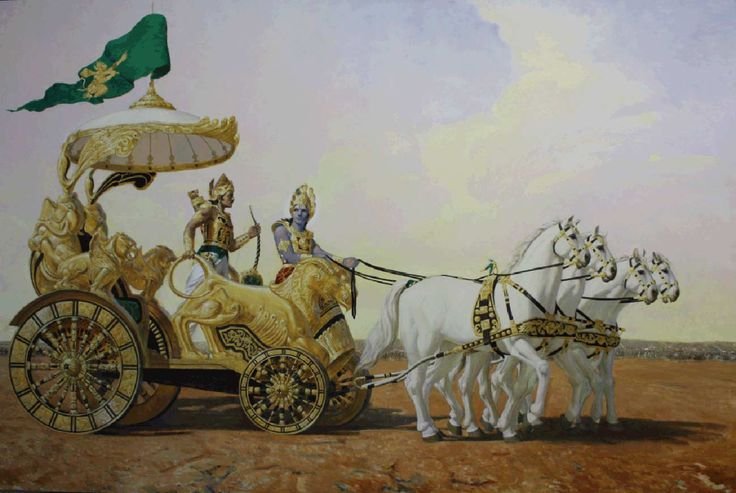

Bhagavad Gita 1.5
धृष्टकेतुश्चेकितानः काशिराजश्च वीर्यवान्। पुरुजित्कुन्तिभोजश्च शैब्यश्च नरपुङ्गवः।।1.5।।
dhṛiṣhṭaketuśhchekitānaḥ kāśhirājaśhcha vīryavān purujit kuntibhojaśhcha śhaibyaśhcha nara-puṅgavaḥ yudhāmanyuśhcha vikrānta uttamaujāśhcha vīryavān
dhṛiṣhṭaketuḥ—Dhrishtaketu; chekitānaḥ—Chekitan; kāśhirājaḥ—Kashiraj; cha—and; vīrya-vān—heroic; purujit—Purujit; kuntibhojaḥ—Kuntibhoj; cha—and; śhaibyaḥ—Shaibya; cha—and; nara-puṅgavaḥ—best of men; yudhāmanyuḥ—Yudhamanyu; cha—and; vikrāntaḥ—courageous; uttamaujāḥ—Uttamauja; cha—and; vīrya-vān—gallant;
Translation
Dhrishtaketu, Chekitana, the valiant king of Kasi, Purujit, Kuntibhoja, and Saibya—the best of men.
Commentary
1.5 धृष्टकेतुः Dhrishtaketu? चेकितानः Chekitana? काशिराजः king of Kasi? च and? वीर्यवान् valiant? पुरुजित् Purujit? कुन्तिभोजः Kuntibhoja? च and? शैब्यः son of Sibi? च and? नरपुङ्गवः the best of men.No Commentary.

Bhagavad Gita 1.6
युधामन्युश्च विक्रान्त उत्तमौजाश्च वीर्यवान्। सौभद्रो द्रौपदेयाश्च सर्व एव महारथाः।।1.6।।
saubhadro draupadeyāśhcha sarva eva mahā-rathāḥ
saubhadraḥ—the son of Subhadra; draupadeyāḥ—the sons of Draupadi; cha—and; sarve—all; eva—indeed; mahā-rathāḥ—warriors who could single handedly match the strength of ten thousand ordinary warriors
Translation
The strong Yudhamanyu and the brave Uttamaujas, the son of Subhadra (Abhimanyu, the son of Subhadra and Arjuna), and the sons of Draupadi, all of them great charioteers (great heroes).”
Commentary
1.6 युधामन्युः Yudhamanyu? च and? विक्रान्तः the strong? उत्तमौजाः Uttamaujas? च and? वीर्यवान् the brave? सौभद्रः the son of Subhadra? द्रौपदेयाः the sons of Draupadi? च and? सर्वे all? एव even? महारथाः great carwarriors.No Commentary.
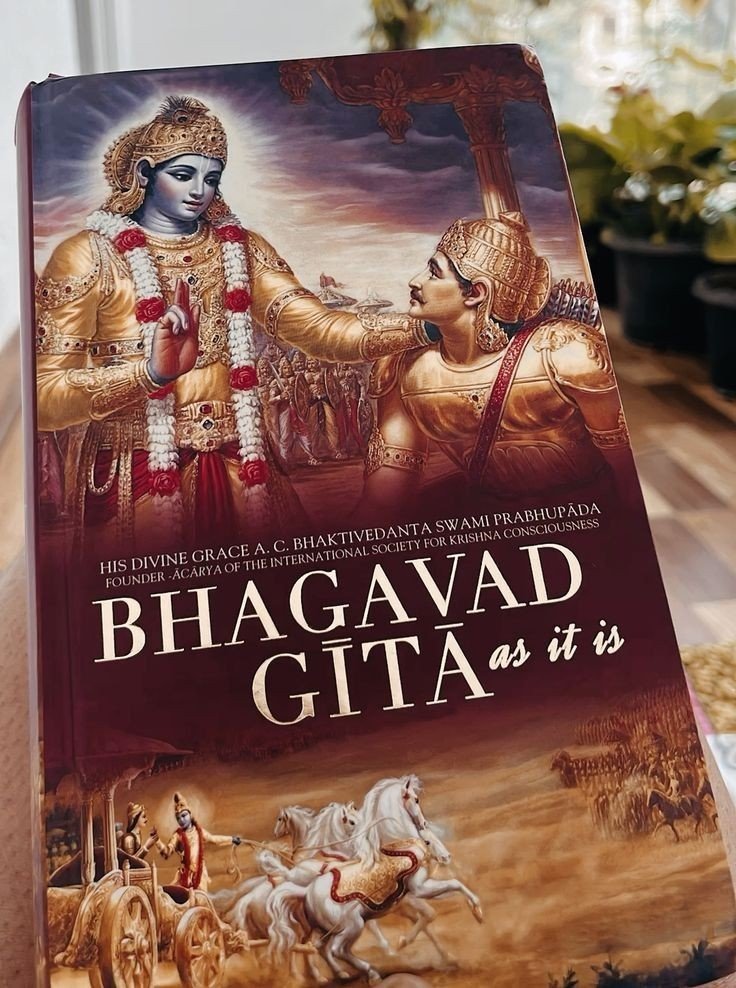

Bhagavad Gita 1.7
अस्माकं तु विशिष्टा ये तान्निबोध द्विजोत्तम। नायका मम सैन्यस्य संज्ञार्थं तान्ब्रवीमि ते।।1.7।।
asmākaṁ tu viśhiṣhṭā ye tānnibodha dwijottama nāyakā mama sainyasya sanjñārthaṁ tānbravīmi te
asmākam—ours; tu—but; viśhiṣhṭāḥ—special; ye—who; tān—them; nibodha—be informed; dwija-uttama—best of Brahmnis; nāyakāḥ—principal generals; mama—our; sainyasya—of army; sanjñā-artham—for information; tān—them; bravīmi—I recount; te—unto you
Translation
Know also, O best among the twice-born! the names of those who are the most distinguished amongst ourselves, the leaders of my army; these I name to you for your information.
Commentary
1.7 अस्माकम् ours? तु also? विशिष्टाः the best? ये who (those)? तान् those? निबोध know (thou)? द्विजोत्तम (O) best among the twicorn ones? नायकाः the leaders? मम my? सैन्यस्य of the army? संज्ञार्थम् for information? तान् them? ब्रवीमि speak? ते to thee.No Commentary.

Bhagavad Gita 1.8
भवान्भीष्मश्च कर्णश्च कृपश्च समितिञ्जयः। अश्वत्थामा विकर्णश्च सौमदत्तिस्तथैव च।।1.8।।
bhavānbhīṣhmaśhcha karṇaśhcha kṛipaśhcha samitiñjayaḥ aśhvatthāmā vikarṇaśhcha saumadattis tathaiva cha
bhavān—yourself; bhīṣhmaḥ—Bheeshma; cha—and; karṇaḥ—Karna; cha—and; kṛipaḥ—Kripa; cha—and; samitim-jayaḥ—victorious in battle; aśhvatthāmā—Ashvatthama; vikarṇaḥ—Vikarna; cha—and; saumadattiḥ—Bhurishrava; tathā—thus; eva—even; cha—also
Translation
“Thou thyself, Bhishma, Karna, Kripa, the victorious in war, Asvatthama, Vikarna, and Bhurisrava, the son of Somadatta—all these are ready for battle.”
Commentary
1.8 भवान् yourself? भीष्मः Bhishma? च and? कर्णः Karna? च and? कृपः Kripa? च and? समितिञ्जयः victorious in war? अश्वत्थामा Asvatthama? the son of Dronacharya? विकर्णः Vikarna? च and? सौमदत्तिः the son of Somadatta? तथा thus? एव even? च and.No Commentary.
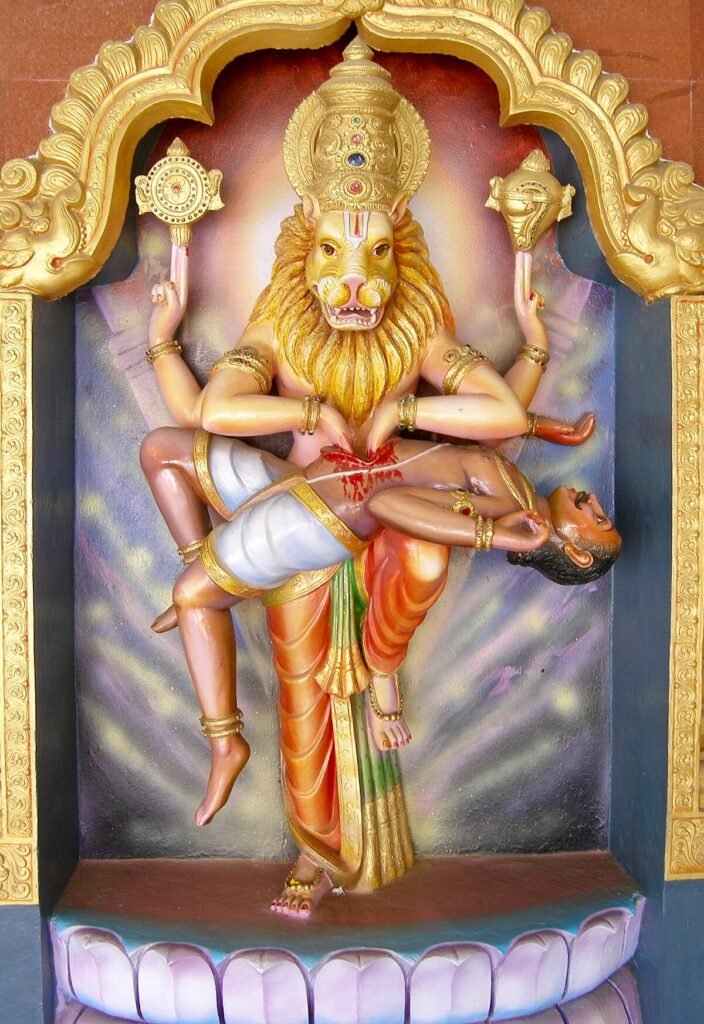

Bhagavad Gita 1.9
अन्ये च बहवः शूरा मदर्थे त्यक्तजीविताः। नानाशस्त्रप्रहरणाः सर्वे युद्धविशारदाः।।1.9।।
anye cha bahavaḥ śhūrā madarthe tyaktajīvitāḥ nānā-śhastra-praharaṇāḥ sarve yuddha-viśhāradāḥ
anye—others; cha—also; bahavaḥ—many; śhūrāḥ—heroic warriors; mat-arthe—for my sake; tyakta-jīvitāḥ—prepared to lay down their lives; nānā-śhastra-praharaṇāḥ—equipped with various kinds of weapons; sarve—all; yuddha-viśhāradāḥ—skilled in the art of warfare
Translation
And also many other heroes, ready to give up their lives for my sake, armed with various weapons and missiles, all well-skilled in battle.
Commentary
1.9 अन्ये others? च and? बहवः many? शूराः heroes? मदर्थे for my sake? त्यक्तजीविताः who are ready to give up their lives? नानाशस्त्रप्रहरणाः armed with various weapons and missiles? सर्वे all? युद्धविशारदाः wellskilled in battle.No Commentary.

Bhagavad Gita 1.10
अपर्याप्तं तदस्माकं बलं भीष्माभिरक्षितम्। पर्याप्तं त्विदमेतेषां बलं भीमाभिरक्षितम्।।1.10।।
aparyāptaṁ tadasmākaṁ balaṁ bhīṣhmābhirakṣhitam paryāptaṁ tvidameteṣhāṁ balaṁ bhīmābhirakṣhitam
aparyāptam—unlimited; tat—that; asmākam—ours; balam—strength; bhīṣhma—by Grandsire Bheeshma; abhirakṣhitam—safely marshalled; paryāptam—limited; tu—but; idam—this; eteṣhām—their; balam—strength; bhīma—Bheem; abhirakṣhitam—carefully marshalled
Translation
Our army, marshalled by Bhishma, is insufficient, whereas theirs, marshalled by Bhima, is sufficient.
Commentary
1.10 अपर्याप्तम् insufficient? तत् that? अस्माकम् ours? बलम् army? भीष्माभिरक्षितम् marshalled by Bhishma? पर्याप्तम् sufficient? तु while? इदम् this? एतेषाम् their? बलम् army? भीमाभिरक्षितम् marshalled by Bhima.Commentary The verse is differently interpreted by different commentators. Sridhara Swami takes the word aparyaptam to mean insufficient. Ananda Giri takes it to mean unlimited.
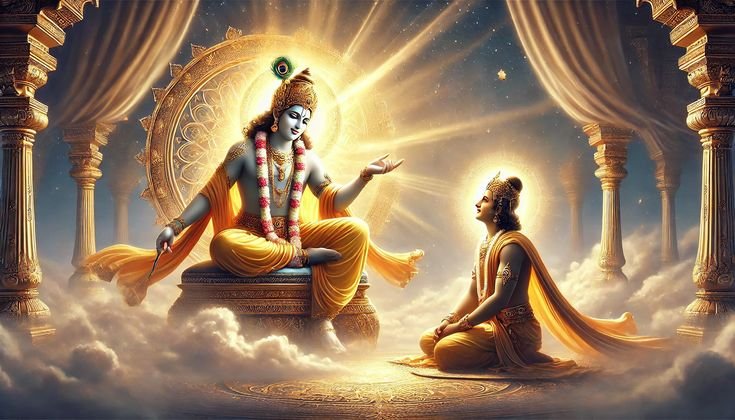

Bhagavad Gita 1.11
अयनेषु च सर्वेषु यथाभागमवस्थिताः। भीष्ममेवाभिरक्षन्तु भवन्तः सर्व एव हि।।1.11।।
ayaneṣhu cha sarveṣhu yathā-bhāgamavasthitāḥ bhīṣhmamevābhirakṣhantu bhavantaḥ sarva eva hi
ayaneṣhu—at the strategic points; cha—also; sarveṣhu—all; yathā-bhāgam—in respective position; avasthitāḥ—situated; bhīṣhmam—to Grandsire Bheeshma; eva—only; abhirakṣhantu—defend; bhavantaḥ—you; sarve—all; eva hi—even as
Translation
Therefore, do all of you, stationed in your respective positions in the several divisions of the army, protect Bhishma alone?
Commentary
1.11 अयनेषु in the arrays (of the army)? च and? सर्वेषु in all? यथाभागम् according to division? अवस्थिताः being stationed? भीष्मम् Bhishma? एव alone? अभिरक्षन्तु protect? भवन्तः ye? सर्वे all? एव even? हि indeed.No Commentary.

Bhagavad Gita 1.12
तस्य संजनयन्हर्षं कुरुवृद्धः पितामहः। सिंहनादं विनद्योच्चैः शङ्खं दध्मौ प्रतापवान्।।1.12।।
tasya sañjanayan harṣhaṁ kuru-vṛiddhaḥ pitāmahaḥ siṁha-nādaṁ vinadyochchaiḥ śhaṅkhaṁ dadhmau pratāpavān
tasya—his; sañjanayan—causing; harṣham—joy; kuru-vṛiddhaḥ—the grand old man of the Kuru dynasty (Bheeshma); pitāmahaḥ—grandfather; sinha-nādam—lion’s roar; vinadya—sounding; uchchaiḥ—very loudly; śhaṅkham—conch shell; dadhmau—blew; pratāpa-vān—the glorious
Translation
His glorious grandsire, the oldest of the Kauravas, roared like a lion to cheer Duryodhana and blew his conch.
Commentary
1.12 तस्य his (Duryodhanas)? संजयन् causing? हर्षम् joy? कुरुवृद्धः oldest of the Kurus? पितामहः grandfather? सिंहनादम् lions roar? विनद्य having sounded? उच्चैः loudly? शङ्खम् conch? दध्मौ blew? प्रतापवान् the glorious.No Commentary.
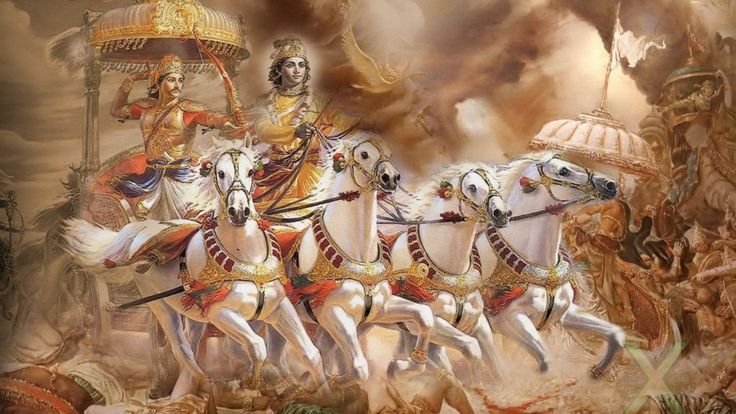

Bhagavad Gita 1.13
ततः शङ्खाश्च भेर्यश्च पणवानकगोमुखाः। सहसैवाभ्यहन्यन्त स शब्दस्तुमुलोऽभवत्।।1.13।।
tataḥ śhaṅkhāśhcha bheryaśhcha paṇavānaka-gomukhāḥ sahasaivābhyahanyanta sa śhabdastumulo ’bhavat
tataḥ—thereafter; śhaṅkhāḥ—conches; cha—and; bheryaḥ—bugles; cha—and; paṇava-ānaka—drums and kettledrums; go-mukhāḥ—trumpets; sahasā—suddenly; eva—indeed; abhyahanyanta—blared forth; saḥ—that; śhabdaḥ—sound; tumulaḥ—overwhelming; abhavat—was
Translation
Then, suddenly, conches, kettledrums, tabors, drums, and cow horns blared forth from the Kaurava side, and the sound was tremendous.
Commentary
1.13 ततः then शङ्खाः conches? च and? भेर्यः kettledrums? च and? पणवानकगोमुखाः tabors? drums and cowhorns? सहसा एव ite suddenly? अभ्यहन्यन्त blared forth? सः that? शब्दः sound? तुमुलः tremendous? अभवत् was.No Commentary.

Bhagavad Gita 1.14
ततः श्वेतैर्हयैर्युक्ते महति स्यन्दने स्थितौ। माधवः पाण्डवश्चैव दिव्यौ शङ्खौ प्रदध्मतुः।।1.14।।
tataḥ śhvetairhayairyukte mahati syandane sthitau mādhavaḥ pāṇḍavaśhchaiva divyau śhaṅkhau pradadhmatuḥ
tataḥ—then; śhvetaiḥ—by white; hayaiḥ—horses; yukte—yoked; mahati—glorious; syandane—chariot; sthitau—seated; mādhavaḥ—Shree Krishna, the husband of the goddess of fortune, Lakshmi; pāṇḍavaḥ—Arjun; cha—and; eva—also; divyau—Divine; śhaṅkhau—conch shells; pradadhmatuḥ—blew
Translation
Then, Madhava (Krishna) and the son of Pandu (Arjuna), seated in the magnificent chariot yoked with white horses, blew divine conches.
Commentary
1.14 ततः then? श्वेतैः (with) white? हयैः horses? युक्ते yoked? महति magnificent? स्यन्दने in the chariot? स्थितौ seated? माधवः Madhava? पाण्डवः Pandava? the son of Pandu? च and? एव also? दिव्यौ divine? शङ्खौ conches? प्रदध्मतुः blew.No Commentary.
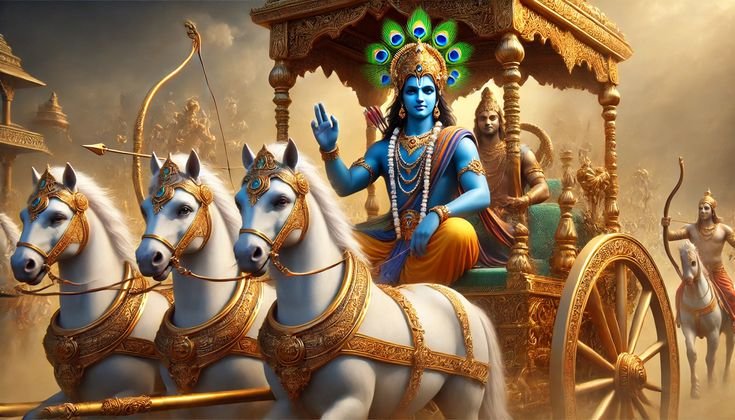

Bhagavad Gita 1.15
पाञ्चजन्यं हृषीकेशो देवदत्तं धनंजयः। पौण्ड्रं दध्मौ महाशङ्खं भीमकर्मा वृकोदरः।।1.15।।
pāñchajanyaṁ hṛiṣhīkeśho devadattaṁ dhanañjayaḥ pauṇḍraṁ dadhmau mahā-śhaṅkhaṁ bhīma-karmā vṛikodaraḥ
pāñchajanyam—the conch shell named Panchajanya; hṛiṣhīka-īśhaḥ—Shree Krishna, the Lord of the mind and senses; devadattam—the conch shell named Devadutta; dhanam-jayaḥ—Arjun, the winner of wealth; pauṇḍram—the conch named Paundra; dadhmau—blew; mahā-śhaṅkham—mighty conch; bhīma-karmā—one who performs herculean tasks; vṛika-udaraḥ—Bheem, the voracious eater
Translation
Hrishikesha blew the Panchajanya, Arjuna blew the Devadatta, and Bhima, the wolf-bellied doer of terrible deeds, blew the great conch Paundra.
Commentary
1.15 पाञ्चजन्यम् (the conch named) Panchajanya? हृषीकेशः (the Lord of the senses) Krishna? देवदत्तम् (the conch named) Devadatta? धनञ्जयः (the victor of wealth) Arjuna? पौण्ड्रम् (the conch named) Poundra? दध्मौ blew? महाशङ्खम् great conch? भीमकर्मा doer of terrible dees? वृकोदरः (having the belly of a wolf) Bhima.No Commentary.

Bhagavad Gita 1.16
अनन्तविजयं राजा कुन्तीपुत्रो युधिष्ठिरः। नकुलः सहदेवश्च सुघोषमणिपुष्पकौ।।1.16।।
anantavijayaṁ rājā kuntī-putro yudhiṣhṭhiraḥ nakulaḥ sahadevaśhcha sughoṣha-maṇipuṣhpakau
ananta-vijayam—the conch named Anantavijay; rājā—king; kuntī-putraḥ—son of Kunti; yudhiṣhṭhiraḥ—Yudhishthir; nakulaḥ—Nakul; sahadevaḥ—Sahadev; cha—and; sughoṣha-maṇipuṣhpakau—the conche shells named Sughosh and Manipushpak;
Translation
King Yudhishthira, the son of Kunti, blew the Anantavijaya; Nakula and Sahadeva blew the Sughosha and the Manipushpaka.
Commentary
1.16 अनन्तविजयम् (the conch named) Anantavijayam? राजा the king? कुन्तीपुत्रः son of Kunti? युधिष्ठिरः Yudhishthira? नकुलः Nakula? सहदेवः Sahadeva? च and? सुघोषमणिपुष्पकौ (the conches named) Sughosha and Manipushpaka.No Commentary.
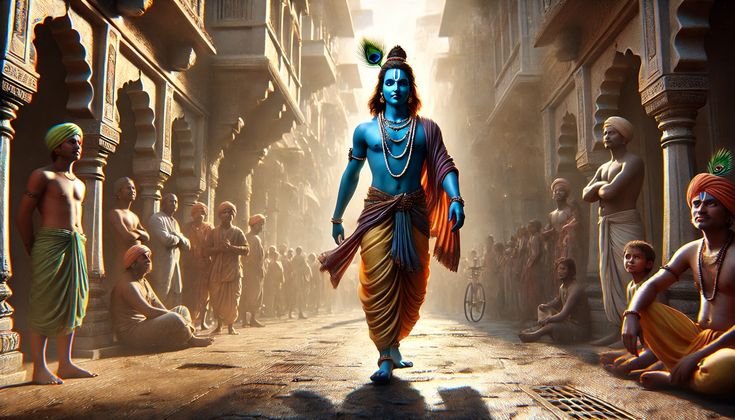

Bhagavad Gita 1.17
काश्यश्च परमेष्वासः शिखण्डी च महारथः। धृष्टद्युम्नो विराटश्च सात्यकिश्चापराजितः।।1.17।।
kāśhyaśhcha parameṣhvāsaḥ śhikhaṇḍī cha mahā-rathaḥ dhṛiṣhṭadyumno virāṭaśhcha sātyakiśh chāparājitaḥ
kāśhyaḥ—King of Kashi; cha—and; parama-iṣhu-āsaḥ—the excellent archer; śhikhaṇḍī—Shikhandi; cha—also; mahā-rathaḥ—warriors who could single handedly match the strength of ten thousand ordinary warriors; dhṛiṣhṭadyumnaḥ—Dhrishtadyumna; virāṭaḥ—Virat; cha—and; sātyakiḥ—Satyaki; cha—and; aparājitaḥ—invincible;
Translation
The king of Kasi, an excellent archer, Sikhandi, the mighty car warrior, Dhrishtadyumna, Virata, and Satyaki, the unconquered.
Commentary
1.17 काश्यः Kasya? the king of Kasi? च and? परमेष्वासः an excellent archer? शिखण्डी Sikhandi? च and? महारथः mighty carwarrior? धृष्टद्युम्नः Dhrishtadyumna? विराटः Virata? च and? सात्यकिः Satyaki? च and? अपराजितः unconered.No Commentary.

Bhagavad Gita 1.18
द्रुपदो द्रौपदेयाश्च सर्वशः पृथिवीपते। सौभद्रश्च महाबाहुः शङ्खान्दध्मुः पृथक्पृथक्।।1.18।।
drupado draupadeyāśhcha sarvaśhaḥ pṛithivī-pate saubhadraśhcha mahā-bāhuḥ śhaṅkhāndadhmuḥ pṛithak pṛithak
drupadaḥ—Drupad; draupadeyāḥ—the five sons of Draupadi; cha—and; sarvaśhaḥ—all; pṛithivī-pate—Ruler of the earth; saubhadraḥ—Abhimanyu, the son of Subhadra; cha—also; mahā-bāhuḥ—the mighty-armed; śhaṅkhān—conch shells; dadhmuḥ—blew; pṛithak pṛithak—individually
Translation
Drupada and the sons of Draupadi, O Lord of the Earth, and the son of Subhadra, the mighty-armed, blew their conches each separately.
Commentary
1.18 द्रुपदः Drupada? द्रौपदेयाः the sons of Draupadi? च and? सर्वशः all? पृथिवीपते O Lord of the earth? सौभद्रः the son of Subhadra (Abhimanyu)? च and महाबाहुः the mightyarmed? शङ्खान् conches? दध्मुः blew? पृथक् पृथक् separately.Commentary This blowing of conches announced the commencement of the battle.
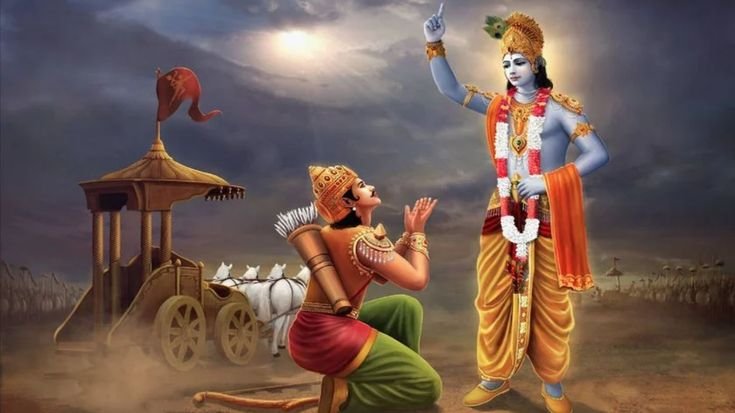

Bhagavad Gita 1.19
स घोषो धार्तराष्ट्राणां हृदयानि व्यदारयत्। नभश्च पृथिवीं चैव तुमुलो व्यनुनादयन्।।1.19।।
sa ghoṣho dhārtarāṣhṭrāṇāṁ hṛidayāni vyadārayat nabhaśhcha pṛithivīṁ chaiva tumulo nunādayan
saḥ—that; ghoṣhaḥ—sound; dhārtarāṣhṭrāṇām—of Dhritarashtra’s sons; hṛidayāni—hearts; vyadārayat—shattered; nabhaḥ—the sky; cha—and; pṛithivīm—the earth; cha—and; eva—certainly; tumulaḥ—terrific sound; abhyanunādayan—thundering
Translation
The tumultuous sound rent the hearts of Dhritarashtra’s party, reverberating through both heaven and earth.
Commentary
1.19 सः that? घोषः uproar? धार्तराष्ट्राणाम् of Dhritarashtras party? हृदयानि hearts? व्यदारयत् rent? नभः sky? च and? पृथिवीम् earth? च and? एव also? तुमुलः tumultuous? व्यनुनादयन् resounding.No Commentary.

Bhagavad Gita 1.20
अथ व्यवस्थितान् दृष्ट्वा धार्तराष्ट्रान्कपिध्वजः। प्रवृत्ते शस्त्रसंपाते धनुरुद्यम्य पाण्डवः।।1.20।।
atha vyavasthitān dṛiṣhṭvā dhārtarāṣhṭrān kapi-dhwajaḥ pravṛitte śhastra-sampāte dhanurudyamya pāṇḍavaḥ hṛiṣhīkeśhaṁ tadā vākyam idam āha mahī-pate
atha—thereupon; vyavasthitān—arrayed; dṛiṣhṭvā—seeing; dhārtarāṣhṭrān—Dhritarashtra’s sons; kapi-dwajaḥ—the Monkey Bannered; pravṛitte—about to commence; śhastra-sampāte—to use the weapons; dhanuḥ—bow; udyamya—taking up; pāṇḍavaḥ—Arjun, the son of Pandu; hṛiṣhīkeśham—to Shree Krishna; tadā—at that time; vākyam—words; idam—these; āha—said; mahī-pate—King
Translation
Then, seeing the people of Dhritarashtra’s party standing arrayed and the discharge of weapons about to begin, Arjuna, the son of Pandu, whose ensign was a monkey, took up his bow and said the following to Krishna, O Lord of the Earth.
Commentary
1.20 अथ now? व्यवस्थितान् standing arrayed? दृष्ट्वा seeing? धार्तराष्ट्रान् Dhritarashtras party? कपिध्वजः monkeyensigned? प्रवृत्ते about to begin? शस्त्रसंपाते discharge of weapons? धनुः bow? उद्यम्य having taken up? पाण्डवः the son of Pandu? हृषीकेशम् to Hrishikesha? तदा then? वाक्यम् word? इदम् this? आह said? महीपते O Lord of the earth.No Commentary.
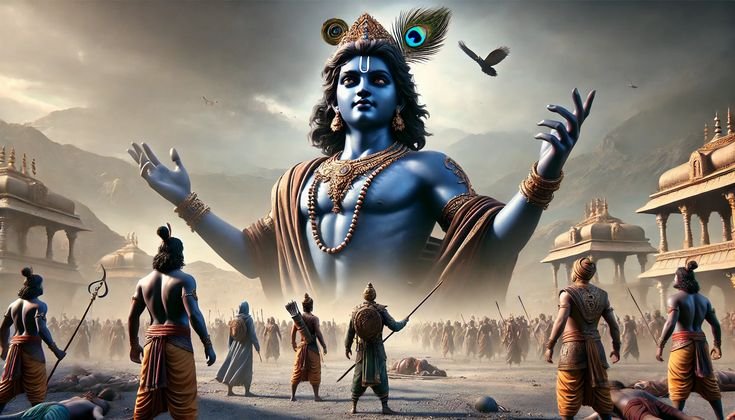

Bhagavad Gita 1.21
अर्जुन उवाच हृषीकेशं तदा वाक्यमिदमाह महीपते। सेनयोरुभयोर्मध्ये रथं स्थापय मेऽच्युत।।1.21।।
arjuna uvācha senayor ubhayor madhye rathaṁ sthāpaya me ’chyuta
arjunaḥ uvācha—Arjun said; senayoḥ—armies; ubhayoḥ—both; madhye—in the middle; ratham—chariot; sthāpaya—place; me—my; achyuta—Shree Krishna, the infallible One;
Translation
Arjuna said, “O Krishna, place my chariot in the middle between the two armies, so that I may behold those who stand here, desirous to fight, and know with whom I must fight when the battle is about to commence.”
Commentary
1.21 — 1.22 सेनयोः of the armies? उभयोः of both? मध्ये in the middle? रथम् car? स्थापय place? मे my? अच्युत O Achyuta (O changeless? Krishna)? यावत् while? एतान् these? निरीक्षे behold? अहम् I? योद्धुकामान् desirous to fight? अवस्थितान् standing? कैः with whom? मया by me? सह together? योद्धव्यम् must be fought? अस्मिन् in this? रणसमुद्यमे eve of battle.No Commentary.

Bhagavad Gita 1.22
यावदेतान्निरीक्षेऽहं योद्धुकामानवस्थितान्। कैर्मया सह योद्धव्यमस्मिन्रणसमुद्यमे।।1.22।।
yāvadetān nirīkṣhe ’haṁ yoddhu-kāmān avasthitān kairmayā saha yoddhavyam asmin raṇa-samudyame
yāvat—as many as; etān—these; nirīkṣhe—look; aham—I; yoddhu-kāmān—for the battle; avasthitān—arrayed; kaiḥ—with whom; mayā—by me; saha—together; yoddhavyam—must fight; asmin—in this; raṇa-samudyame—great combat
Translation
Arjuna said, “O Krishna, place my chariot in the middle between the two armies, so that I may behold those who stand here, desirous to fight, and know with whom I must fight when the battle is about to commence.”
Commentary
1.21 — 1.22 सेनयोः of the armies? उभयोः of both? मध्ये in the middle? रथम् car? स्थापय place? मे my? अच्युत O Achyuta (O changeless? Krishna)? यावत् while? एतान् these? निरीक्षे behold? अहम् I? योद्धुकामान् desirous to fight? अवस्थितान् standing? कैः with whom? मया by me? सह together? योद्धव्यम् must be fought? अस्मिन् in this? रणसमुद्यमे eve of battle.No Commentary.

Bhagavad Gita 1.23
योत्स्यमानानवेक्षेऽहं य एतेऽत्र समागताः। धार्तराष्ट्रस्य दुर्बुद्धेर्युद्धे प्रियचिकीर्षवः।।1.23।।
yotsyamānān avekṣhe ’haṁ ya ete ’tra samāgatāḥ dhārtarāṣhṭrasya durbuddher yuddhe priya-chikīrṣhavaḥ
yotsyamānān—those who have come to fight; avekṣhe aham—I desire to see; ye—who; ete—those; atra—here; samāgatāḥ—assembled; dhārtarāṣhṭrasya—of Dhritarashtra’s son; durbuddheḥ—evil-minded; yuddhe—in the fight; priya-chikīrṣhavaḥ—wishing to please
Translation
For I desire to observe those who are assembled here to fight, wishing to please in battle the evil-minded Duryodhana—the son of Dhritarashtra.
Commentary
1.23 योत्स्यमानान् with the object of fighting? अवेक्षे observe? अहम् I? ये who? एते those? अत्र here (in this Kurukshetra)? समागताः assembled? धार्तराष्ट्रस्य of the son of Dhritarashtra? दुर्बुद्धेः of the evilminded? युद्धे in battle? प्रियचिकीर्षवः wishing to please.No Commentary.

Bhagavad Gita 1.24
संजय उवाच एवमुक्तो हृषीकेशो गुडाकेशेन भारत। सेनयोरुभयोर्मध्ये स्थापयित्वा रथोत्तमम्।।1.24।।
sañjaya uvācha evam ukto hṛiṣhīkeśho guḍākeśhena bhārata senayor ubhayor madhye sthāpayitvā rathottamam
sañjayaḥ uvācha—Sanjay said; evam—thus; uktaḥ—addressed; hṛiṣhīkeśhaḥ—Shree Krishna, the Lord of the senses; guḍākeśhena—by Arjun, the conqueror of sleep; bhārata—descendant of Bharat; senayoḥ—armies; ubhayoḥ—the two; madhye—between; sthāpayitvā—having drawn; ratha-uttamam—magnificent chariot
Translation
Sanjaya said, Thus addressed by Arjuna, Krishna stationed the best of chariots, O Dhritarashtra, in the midst of the two armies.
Commentary
1.24 एवम् thus? उक्तः addressed? हृषीकेशः Hrishikesha? गुडाकेशेन by Gudakesha (the coneror of sleep? Arjuna)? भारत O Bharata (descendant of king Bharata? Dhritarashtra)? सेनयोः of the armies? उभयोः of both? मध्ये in the middle? स्थापयित्वा having stationed? रथोत्तमम् best of chariots.No Commentary.

Bhagavad Gita 1.25
भीष्मद्रोणप्रमुखतः सर्वेषां च महीक्षिताम्। उवाच पार्थ पश्यैतान्समवेतान्कुरूनिति।।1.25।।
bhīṣhma-droṇa-pramukhataḥ sarveṣhāṁ cha mahī-kṣhitām uvācha pārtha paśhyaitān samavetān kurūn iti
bhīṣhma—Grandsire Bheeshma; droṇa—Dronacharya; pramukhataḥ—in the presence; sarveṣhām—all; cha—and; mahī-kṣhitām—other kings; uvācha—said; pārtha—Arjun, the son of Pritha; paśhya—behold; etān—these; samavetān—gathered; kurūn—descendants of Kuru; iti—thus
Translation
In front of Bhishma and Drona, and all the rulers of the earth, he said: “O Arjuna, son of Pritha, behold these Kurus gathered together.”
Commentary
1.25 भीष्मद्रोणप्रमुखतः in front of Bhishma and Drona? सर्वेषाम् of all? च and? महीक्षिताम् rulers of the earth? उवाच said? पार्थ O Partha? पश्य behold? एतान् these? समवेतान् gathered? कुरून् Kurus? इति thus.No Commentary.

Bhagavad Gita 1.26
तत्रापश्यत्स्थितान्पार्थः पितृ़नथ पितामहान्। आचार्यान्मातुलान्भ्रातृ़न्पुत्रान्पौत्रान्सखींस्तथा।।1.26।।
tatrāpaśhyat sthitān pārthaḥ pitṝīn atha pitāmahān āchāryān mātulān bhrātṝīn putrān pautrān sakhīṁs tathā śhvaśhurān suhṛidaśh chaiva senayor ubhayor api
tatra—there; apaśhyat—saw; sthitān—stationed; pārthaḥ—Arjun; pitṝīn—fathers; atha—thereafter; pitāmahān—grandfathers; āchāryān—teachers; mātulān—maternal uncles; bhrātṝīn—brothers; putrān—sons; pautrān—grandsons; sakhīn—friends; tathā—also; śhvaśhurān—fathers-in-law; suhṛidaḥ—well-wishers; cha—and; eva—indeed; senayoḥ—armies; ubhayoḥ—in both armies; api—also
Translation
Then, Arjuna (son of Pritha) saw there (in the armies) stationed fathers, grandfathers, teachers, maternal uncles, brothers, sons, grandsons, and friends.
Commentary
1.26 तत्र there? अपश्यत् saw? स्थितान् stationed? पार्थः Partha? पितृ़न् fathers? अथ also? पितामहान्grandfathers? आचार्यान् teachers? मातुलान् maternal uncles? भ्रातृ़न् brothers? पुत्रान् sons? पौत्रान् grandsons? सखीन् friends? तथा too.No Commentary.

Bhagavad Gita 1.27
श्वशुरान्सुहृदश्चैव सेनयोरुभयोरपि। तान्समीक्ष्य स कौन्तेयः सर्वान्बन्धूनवस्थितान्।।1.27।।
tān samīkṣhya sa kaunteyaḥ sarvān bandhūn avasthitān kṛipayā parayāviṣhṭo viṣhīdann idam abravīt
tān—these; samīkṣhya—on seeing; saḥ—they; kaunteyaḥ—Arjun, the son of Kunti; sarvān—all; bandhūn—relatives; avasthitān—present; kṛipayā—by compassion; parayā—great; āviṣhṭaḥ—overwhelmed; viṣhīdan—deep sorrow; idam—this; abravīt—spoke
Translation
He saw fathers-in-law and friends in both the armies. The son of Kunti, Arjuna, seeing all those kinsmen thus standing arrayed, spoke sorrowfully, deeply filled with pity.
Commentary
1.27 श्वशुरान् fathersinlaw? सुहृदः friends? च and? एव also? सेनयोः in armies? उभयोः (in) both? अपि also? तान् those? समीक्ष्य having seen? सः he? कौन्तेयः Kaunteya? सर्वान् all? बन्धून् relatives? अवस्थितान् standing (arrayed)? कृपया by pity? परया deep? आविष्टः filled? विषीदन् sorrowfully? इदम् this? अब्रवीत् said.No Commentary
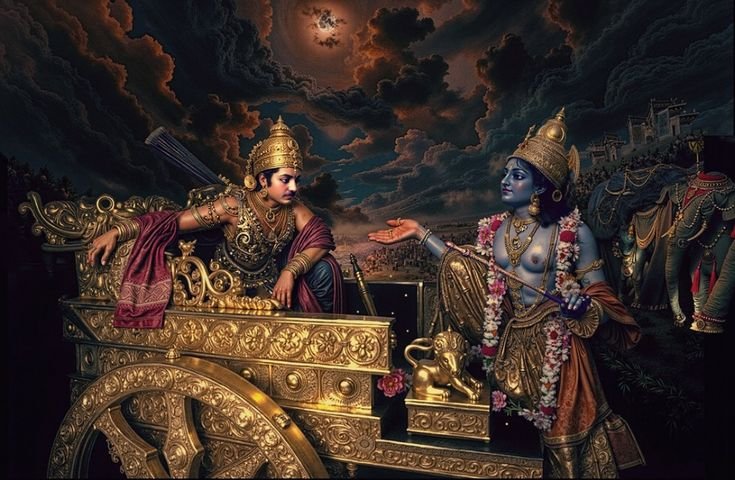

Bhagavad Gita 1.28
अर्जुन उवाच कृपया परयाऽऽविष्टो विषीदन्निदमब्रवीत्। दृष्ट्वेमं स्वजनं कृष्ण युयुत्सुं समुपस्थितम्।।1.28।।
arjuna uvācha dṛiṣhṭvemaṁ sva-janaṁ kṛiṣhṇa yuyutsuṁ samupasthitam
arjunaḥ uvācha—Arjun said; dṛiṣhṭvā—on seeing; imam—these; sva-janam—kinsmen; kṛiṣhṇa—Krishna; yuyutsum—eager to fight; samupasthitam—present;
Translation
Arjuna said, “O Krishna, seeing my kinsmen arrayed here, eager to fight,
Commentary
1.28 दृष्ट्वा having seen? इमम् these? स्वजनम् kinsmen? कृष्ण O Krishna (the dark one? He who attracts)? युयुत्सुम् eager to fight? समुपस्थितम् arrayed.No Commentary.

Bhagavad Gita 1.29
सीदन्ति मम गात्राणि मुखं च परिशुष्यति। वेपथुश्च शरीरे मे रोमहर्षश्च जायते।।1.29।।
sīdanti mama gātrāṇi mukhaṁ cha pariśhuṣhyati vepathuśh cha śharīre me roma-harṣhaśh cha jāyate
sīdanti—quivering; mama—my; gātrāṇi—limbs; mukham—mouth; cha—and; pariśhuṣhyati—is drying up vepathuḥ—shuddering; cha—and; śharīre—on the body; me—my; roma-harṣhaḥ—standing of bodily hair on end; cha—also; jāyate—is happening;
Translation
My limbs fail, my mouth is parched, my body quivers, and my hair stands on end.
Commentary
1.29 सीदन्ति fail? मम my? गात्राणि limbs? मुखम् mouth? च and? परिशुष्यति is parching? वेपथुः shivering? च and? शरीरे in body? मे my? रोमहर्षः horripilation? च and? जायते arises.No Commentary.

Bhagavad Gita 1.30
गाण्डीवं स्रंसते हस्तात्त्वक्चैव परिदह्यते। न च शक्नोम्यवस्थातुं भ्रमतीव च मे मनः।।1.30।।
gāṇḍīvaṁ sraṁsate hastāt tvak chaiva paridahyate na cha śhaknomy avasthātuṁ bhramatīva cha me manaḥ
gāṇḍīvam—Arjun’s bow; sraṁsate—is slipping; hastāt—from (my) hand; tvak—skin; cha—and; eva—indeed; paridahyate—is burning all over; na—not; cha—and; śhaknomi—am able; avasthātum—remain steady; bhramati iva—whirling like; cha—and; me—my; manaḥ—mind;
Translation
The Gandiva slips from my hand, and my skin burns all over; I am unable to stand, and my mind is reeling, as it were.
Commentary
1.30 गाण्डीवम् Gandiva? स्रंसते slips? हस्तात् from (my) hand? त्वक् (my) skin? च and? एव also? परिदह्यते burns all over? न not? च and? शक्नोमि (I) am able? अवस्थातुम्? to stand? भ्रमति इव seems whirling? च and? मे my? मनः mind Commentary.

Bhagavad Gita 1.31
निमित्तानि च पश्यामि विपरीतानि केशव। न च श्रेयोऽनुपश्यामि हत्वा स्वजनमाहवे।।1.31।।
nimittāni cha paśhyāmi viparītāni keśhava na cha śhreyo ’nupaśhyāmi hatvā sva-janam āhave
nimittāni—omens; cha—and; paśhyāmi—I see; viparītāni—misfortune; keśhava—Shree Krishna, killer of the Keshi demon; na—not; cha—also; śhreyaḥ—good; anupaśhyāmi—I foresee; hatvā—from killing; sva-janam—kinsmen; āhave—in battle
Translation
And I see ill omens, O Kesava. I do not see any good in slaying my kinsmen in battle.
Commentary
1.31 निमित्तानि omens? च and? पश्यामि I see? विपरीतानि adverse? केशव O Kesava? न not? च and? श्रेयः good? अनुपश्यामि (I) see? हत्वा killing? स्वजनम् our peope? आहवे in battle.Commentary Kesava means he who has fine or luxuriant hair.

Bhagavad Gita 1.32
न काङ्क्षे विजयं कृष्ण न च राज्यं सुखानि च। किं नो राज्येन गोविन्द किं भोगैर्जीवितेन वा।।1.32।।
na kāṅkṣhe vijayaṁ kṛiṣhṇa na cha rājyaṁ sukhāni cha kiṁ no rājyena govinda kiṁ bhogair jīvitena vā
na—nor; kāṅkṣhe—do I desire; vijayam—victory; kṛiṣhṇa—Krishna; na—nor; cha—as well; rājyam—kingdom; sukhāni—happiness; cha—also; kim—what; naḥ—to us; rājyena—by kingdom; govinda—Krishna, he who gives pleasure to the senses, he who is fond of cows; kim—what?; bhogaiḥ—pleasures; jīvitena—life; vā—or;
Translation
I desire not victory, O Krishna, nor kingdom, nor pleasures. What use is dominion to us, O Krishna, or pleasures or even life?
Commentary
1.32 न not? काङ्क्षे (I) desire? विजयम् victory? कृष्ण O Krishna? न not? च and? राज्यम् kingdom? सुखानि pleasures? च and? किम् what? नः to us? राज्येन by kindom? गोविन्द O Govinda? किम् what? भोगैः by pleasures? जीवितेन life? वा or.No Commentary.

Bhagavad Gita 1.33
येषामर्थे काङ्क्षितं नो राज्यं भोगाः सुखानि च। त इमेऽवस्थिता युद्धे प्राणांस्त्यक्त्वा धनानि च।।1.33।।
yeṣhām arthe kāṅkṣhitaṁ no rājyaṁ bhogāḥ sukhāni cha ta ime ’vasthitā yuddhe prāṇāṁs tyaktvā dhanāni cha
yeṣhām—for whose; arthe—sake; kāṅkṣhitam—coveted for; naḥ—by us; rājyam—kingdom; bhogāḥ—pleasures; sukhāni—happiness; cha—also; te—they; ime—these; avasthitāḥ—situated; yuddhe—for battle; prāṇān—lives; tyaktvā—giving up; dhanāni—wealth; cha—also
Translation
Those for whose sake we desire kingdom, enjoyments, and pleasures stand here in battle, having renounced life and wealth.
Commentary
1.33 येषाम् of whose? अर्थे sake? काङ्क्षितम् (is) desired? नः by us? राज्यम् kingdom? भोगाः enjoyment? सुखानि pleasures? च and? ते they? इमे these? अवस्थिताः stand? युद्धे in battle? प्राणान् life? त्यक्त्वा having abandoned? धनानि wealth? च and.No Commentary.

Bhagavad Gita 1.34
आचार्याः पितरः पुत्रास्तथैव च पितामहाः। मातुलाः श्चशुराः पौत्राः श्यालाः सम्बन्धिनस्तथा।।1.34।।
āchāryāḥ pitaraḥ putrās tathaiva cha pitāmahāḥ mātulāḥ śhvaśhurāḥ pautrāḥ śhyālāḥ sambandhinas tathā
āchāryāḥ—teachers; pitaraḥ—fathers; putrāḥ—sons; tathā—as well; eva—indeed; cha—also; pitāmahāḥ—grandfathers; mātulāḥ—maternal uncles; śhvaśhurāḥ—fathers-in-law; pautrāḥ—grandsons; śhyālāḥ—brothers-in-law; sambandhinaḥ—kinsmen; tathā—as well;
Translation
Teachers, fathers, sons, and grandfathers, maternal uncles, fathers-in-law, grandsons, brothers-in-law, and other relatives—
Commentary
आचार्याः teachers? पितरः fathers? पुत्राः sons? तथा thus? एव also? च and? पितामहाः grandfathers? मातुलाः maternal uncles? श्वशुराः fathersinlaw? पौत्राः grandsons? श्यालाः brothersinlaw? सम्बन्धिनः relatives? तथा as well as.No Commentary.

Bhagavad Gita 1.35
एतान्न हन्तुमिच्छामि घ्नतोऽपि मधुसूदन। अपि त्रैलोक्यराज्यस्य हेतोः किं नु महीकृते।।1.35।।
etān na hantum ichchhāmi ghnato ’pi madhusūdana api trailokya-rājyasya hetoḥ kiṁ nu mahī-kṛite
etān—these; na—not; hantum—to slay; ichchhāmi—I wish; ghnataḥ—killed; api—even though; madhusūdana—Shree Krishna, killer of the demon Madhu; api—even though; trai-lokya-rājyasya—dominion over three worlds; hetoḥ—for the sake of; kim nu—what to speak of; mahī-kṛite—for the earth
Translation
These I do not wish to kill, O Krishna, even though they kill me, for the sake of dominion over the three worlds; leave alone killing them for the sake of the earth.”
Commentary
1.35 एतान् these? न not? हन्तुम् to kill? इच्छामि (I) wish? घ्नतःअपि even if they kill me? मधुसूदन O Madhusudana (the slayer of Madhu? a demon)? अपि even? त्रैलोक्यराज्यस्य dominion over the three worlds? हेतोः for the sake of? किम् how? नु then? महीकृते for the sake of the earth.No Commentary.

Bhagavad Gita 1.36
निहत्य धार्तराष्ट्रान्नः का प्रीतिः स्याज्जनार्दन। पापमेवाश्रयेदस्मान्हत्वैतानाततायिनः।।1.36।।
nihatya dhārtarāṣhṭrān naḥ kā prītiḥ syāj janārdana pāpam evāśhrayed asmān hatvaitān ātatāyinaḥ
nihatya—by killing; dhārtarāṣhṭrān—the sons of Dhritarashtra; naḥ—our; kā—what; prītiḥ—pleasure; syāt—will there be; janārdana—he who looks after the public, Shree Krishna; pāpam—vices; eva—certainly; āśhrayet—must come upon; asmān—us; hatvā—by killing; etān—all these; ātatāyinaḥ—aggressors;
Translation
By killing these sons of Dhritarashtra, what pleasure could be ours, O Janardana? Only sin would accrue to us from killing these felons.
Commentary
1.36 निहत्य having slain? धार्तराष्ट्रान् sons of Dhritarashtra? नः to us? का what? प्रीतिः pleasure? स्यात् may be? जनार्दन O Janardana? पापम् sin? एव only? आश्रयेत् would take hold? अस्मान् to us? हत्वा having killed? एतान् these? आततायिनः felons.Commentary Janardana means one who is worshipped by all for prosperity and salvation — Krishna.He who sets fire to the house of another? who gives poision?
who runs with sword to kill? who has plundered wealth and lands? and who has taken hold of the wife of somebody else is an atatayi. Duryodhana had done all these evil actions.

Bhagavad Gita 1.37
तस्मान्नार्हा वयं हन्तुं धार्तराष्ट्रान्स्वबान्धवान्। स्वजनं हि कथं हत्वा सुखिनः स्याम माधव।।1.37।।
tasmān nārhā vayaṁ hantuṁ dhārtarāṣhṭrān sa-bāndhavān sva-janaṁ hi kathaṁ hatvā sukhinaḥ syāma mādhava
tasmāt—hence; na—never; arhāḥ—behoove; vayam—we; hantum—to kill; dhārtarāṣhṭrān—the sons of Dhritarashtra; sva-bāndhavān—along with friends; sva-janam—kinsmen; hi—certainly; katham—how; hatvā—by killing; sukhinaḥ—happy; syāma—will we become; mādhava—Shree Krishna, the husband of Yogmaya
Translation
Therefore, we should not kill the sons of Dhritarashtra, our relatives; for how can we be happy by killing our own kin, O Madhava (Krishna)?
Commentary
1.37 तस्मात् therefore? न (are) not? अर्हाः justified? वयम् we? हन्तुम् to kill? धार्तराष्ट्रान् the sons of Dhritarashtra? स्वबान्धवान् our relatives? स्वजनम् kinsmen? हि indeed? कथम् how? हत्वा having killed? सुखिनः happy? स्याम may (we) be? माधव O Madhava.No Commentary.

Bhagavad Gita 1.38
यद्यप्येते न पश्यन्ति लोभोपहतचेतसः। कुलक्षयकृतं दोषं मित्रद्रोहे च पातकम्।।1.38।।
yady apy ete na paśhyanti lobhopahata-chetasaḥ kula-kṣhaya-kṛitaṁ doṣhaṁ mitra-drohe cha pātakam
yadi api—even though; ete—they; na—not; paśhyanti—see; lobha—greed; upahata—overpowered; chetasaḥ—thoughts; kula-kṣhaya-kṛitam—in annihilating their relatives; doṣham—fault; mitra-drohe—to wreak treachery upon friends; cha—and; pātakam—sin;
Translation
Though they, with intelligence overpowered by greed, see no evil in the destruction of families and no sin in hostility to friends,
Commentary
1.38 यद्यपि though? एते these? न not? पश्यन्ति see? लोभोपहतचेतसः with intelligence overpowered by greed? कुलक्षयकृतम् in the destruction of families? दोषम् evil? मित्रद्रोहे in hostility to friends? च and? पातकम् sin.No Commentary.BG 1.38

Bhagavad Gita 1.39
कथं न ज्ञेयमस्माभिः पापादस्मान्निवर्तितुम्। कुलक्षयकृतं दोषं प्रपश्यद्भिर्जनार्दन।।1.39।।
kathaṁ na jñeyam asmābhiḥ pāpād asmān nivartitum kula-kṣhaya-kṛitaṁ doṣhaṁ prapaśhyadbhir janārdana
katham—why; na—not; jñeyam—should be known; asmābhiḥ—we; pāpāt—from sin; asmāt—these; nivartitum—to turn away; kula-kṣhaya—killing the kindered; kṛitam—done; doṣham—crime; prapaśhyadbhiḥ—who can see; janārdana—he who looks after the public, Shree Krishna
Translation
Why should we not, who clearly see the evil in the destruction of families, learn to turn away from this sin, O Janardana (Krishna)?
Commentary
1.39 कथम् why? न not? ज्ञेयम् should be learnt? अस्माभिः by us? पापात् from sin? अस्मात् this? निवर्तितुम् to turn away? कुलक्षयकृतम् in the destruction of families? दोषम् evil? प्रपश्यद्भिः clearly seeing? जनार्दन O Janardana.Commentary Ignorance of law is no excuse but wanton sinful conduct is a grave crime? unworthy of us? who are wiser.

Bhagavad Gita 1.40
कुलक्षये प्रणश्यन्ति कुलधर्माः सनातनाः। धर्मे नष्टे कुलं कृत्स्नमधर्मोऽभिभवत्युत।।1.40।।
kula-kṣhaye praṇaśhyanti kula-dharmāḥ sanātanāḥ dharme naṣhṭe kulaṁ kṛitsnam adharmo ’bhibhavaty uta
kula-kṣhaye—in the destruction of a dynasty; praṇaśhyanti—are vanquished; kula-dharmāḥ—family traditions; sanātanāḥ—eternal; dharme—religion; naṣhṭe—is destroyed; kulam—family; kṛitsnam—the whole; adharmaḥ—irreligion; abhibhavati—overcome; uta—indeed
Translation
In the destruction of a family, the immemorial religious rites of that family perish; on the destruction of spirituality, impiety indeed, overwhelms the whole family.
Commentary
1.40 कुलक्षये in the destruction of a family? प्रणश्यन्ति perish? कुलधर्माः family religious rites? सनातनाः immemorial? धर्मे spirituality? नष्टे being destroyed? कुलम् कृत्स्नम् the whole family? अधर्मः impiety? अभिभवति overcomes? उत indeed.Commentary Dharma — the duties and ceremonies practised by the family in accordance with the injunctions of the scriptures.

Bhagavad Gita 1.41
अधर्माभिभवात्कृष्ण प्रदुष्यन्ति कुलस्त्रियः। स्त्रीषु दुष्टासु वार्ष्णेय जायते वर्णसङ्करः।।1.41।।
adharmābhibhavāt kṛiṣhṇa praduṣhyanti kula-striyaḥ strīṣhu duṣhṭāsu vārṣhṇeya jāyate varṇa-saṅkaraḥ
adharma—irreligion; abhibhavāt—preponderance; kṛiṣhṇa—Shree Krishna; praduṣhyanti—become immoral; kula-striyaḥ—women of the family; strīṣhu—of women; duṣhṭāsu—become immoral; vārṣhṇeya—descendant of Vrishni; jāyate—are born; varṇa-saṅkaraḥ—unwanted progeny
Translation
O Krishna, by the prevalence of impiety, the women of the family become corrupt; and, when women are corrupted, O Varshenya (descendant of Vrishni), intermingling of castes arises.
Commentary
1.41 अधर्माभिभवात् from the prevalence of impiety? कृष्ण O Krishna? प्रदुष्यन्ति become corrupt? कुलस्त्रियः the women of the family? स्त्रीषु in women? दुष्टासु (being) corrupt? वार्ष्णेय O Varshneya? जायते arises? वर्णसङ्करः casteadmixture.No Commentary.

Bhagavad Gita 1.42
सङ्करो नरकायैव कुलघ्नानां कुलस्य च। पतन्ति पितरो ह्येषां लुप्तपिण्डोदकक्रियाः।।1.42।।
saṅkaro narakāyaiva kula-ghnānāṁ kulasya cha patanti pitaro hy eṣhāṁ lupta-piṇḍodaka-kriyāḥ
saṅkaraḥ—unwanted children; narakāya—hellish; eva—indeed; kula-ghnānām—for those who destroy the family; kulasya—of the family; cha—also; patanti—fall; pitaraḥ—ancestors; hi—verily; eṣhām—their; lupta—deprived of; piṇḍodaka-kriyāḥ—performances of sacrificial offerings
Translation
Confusion of castes leads to hell for the slayers of the family, for their forebears fall, deprived of the offerings of rice-balls and libations of water.
Commentary
1.42 सङ्करः confusion of castes? नरकाय for the hell? एव also? कुलघ्नानाम् of the slayers of the family?कुलस्य of the family? च and? पतन्ति fall? पितरः the forefathers? हि verily? एषां their? लुप्तपिण्डोदकक्रियाः deprived of the offerings of ricall and water.No Commentary.

Bhagavad Gita 1.43
दोषैरेतैः कुलघ्नानां वर्णसङ्करकारकैः। उत्साद्यन्ते जातिधर्माः कुलधर्माश्च शाश्वताः।।1.43।।
doṣhair etaiḥ kula-ghnānāṁ varṇa-saṅkara-kārakaiḥ utsādyante jāti-dharmāḥ kula-dharmāśh cha śhāśhvatāḥ
doṣhaiḥ—through evil deeds; etaiḥ—these; kula-ghnānām—of those who destroy the family; varṇa-saṅkara—unwanted progeny; kārakaiḥ—causing; utsādyante—are ruined; jāti-dharmāḥ—social and family welfare activities; kula-dharmāḥ—family traditions; cha—and; śhāśhvatāḥ—eternal
Translation
By these evil deeds of the destroyers of the family, which cause confusion of castes, the eternal religious rites of the caste and the family are destroyed.
Commentary
1.43 दोषैः by evil deeds? एतैः (by) these? कुलघ्नानाम् of the family destroyers? वर्णसङ्करकारकैः causing intermingling of castes? उत्साद्यन्ते are destroyed? जातिधर्माः religious rites of the caste? कुलधर्माः family religious rites? च and? शाश्वताः eternal.No Commentary.

Bhagavad Gita 1.44
उत्सन्नकुलधर्माणां मनुष्याणां जनार्दन। नरकेऽनियतं वासो भवतीत्यनुशुश्रुम।।1.44।।
utsanna-kula-dharmāṇāṁ manuṣhyāṇāṁ janārdana narake ‘niyataṁ vāso bhavatītyanuśhuśhruma
utsanna—destroyed; kula-dharmāṇām—whose family traditions; manuṣhyāṇām—of such human beings; janārdana—he who looks after the public, Shree Krishna; narake—in hell; aniyatam—indefinite; vāsaḥ—dwell; bhavati—is; iti—thus; anuśhuśhruma—I have heard from the learned
Translation
We have heard, O Janardana, that those men in whose families the religious practices have been destroyed are inevitably destined to dwell in hell for an unknown period.
Commentary
1.44 उत्सन्नकुलधर्माणाम् whose family religious practices are destroyed? मनुष्याणाम् of the men? जनार्दन O Janardana? नरके in hell? अनियतं for unknown period? वासः dwelling? भवति is? इति thus? अनुशुश्रुम we have heard.No Commentary.

Bhagavad Gita 1.45
अहो बत महत्पापं कर्तुं व्यवसिता वयम्। यद्राज्यसुखलोभेन हन्तुं स्वजनमुद्यताः।।1.45।।
aho bata mahat pāpaṁ kartuṁ vyavasitā vayam yad rājya-sukha-lobhena hantuṁ sva-janam udyatāḥ
aho—alas; bata—how; mahat—great; pāpam—sins; kartum—to perform; vyavasitāḥ—have decided; vayam—we; yat—because; rājya-sukha-lobhena—driven by the desire for kingly pleasure; hantum—to kill; sva-janam—kinsmen; udyatāḥ—intending;
Translation
Alas! We are involved in a great sin, for we are prepared to kill our kinsmen, out of greed for the pleasures of a kingdom.
Commentary
1.45 अहो बत alas? महत् great? पापम् sin? कर्तुम् to do? व्यवसिताः prepared? वयम् we? यत् that? राज्यसुखलोभेन by the greed of pleasure of kingdom? हन्तुम् to kill? स्वजनम् kinsmen? उद्यताः prepared.No Commentary.

Bhagavad Gita 1.46
यदि मामप्रतीकारमशस्त्रं शस्त्रपाणयः। धार्तराष्ट्रा रणे हन्युस्तन्मे क्षेमतरं भवेत्।।1.46।।
yadi mām apratīkāram aśhastraṁ śhastra-pāṇayaḥ dhārtarāṣhṭrā raṇe hanyus tan me kṣhemataraṁ bhavet
yadi—if; mām—me; apratīkāram—unresisting; aśhastram—unarmed; śhastra-pāṇayaḥ—those with weapons in hand; dhārtarāṣhṭrāḥ—the sons of Dhritarashtra; raṇe—on the battlefield; hanyuḥ—shall kill; tat—that; me—to me; kṣhema-taram—better; bhavet—would be
Translation
If the sons of Dhritarashtra, with weapons in hand, should slay me in battle, unresisting and unarmed, that would be better for me.
Commentary
1.46 यदि if? माम् me? अप्रतीकारम् unresisting? अशस्त्रम् unarmed? शस्त्रपाणयः with weapons in hand? धार्तराष्ट्राः the sons of Dhritarashtra? रणे in the battle हन्युः should slay? तत् that? मे of me? क्षेमतरम् better? भवेत् would be.No Commentary.

Bhagavad Gita 1.47
सञ्जय उवाच एवमुक्त्वाऽर्जुनः संख्ये रथोपस्थ उपाविशत्। विसृज्य सशरं चापं शोकसंविग्नमानसः।।1.47।।
sañjaya uvācha evam uktvārjunaḥ saṅkhye rathopastha upāviśhat visṛijya sa-śharaṁ chāpaṁ śhoka-saṁvigna-mānasaḥ
sañjayaḥ uvācha—Sanjay said; evam uktvā—speaking thus; arjunaḥ—Arjun; saṅkhye—in the battlefield; ratha upasthe—on the chariot; upāviśhat—sat; visṛijya—casting aside; sa-śharam—along with arrows; chāpam—the bow; śhoka—with grief; saṁvigna—distressed; mānasaḥ—mind
Translation
Sanjaya said, Having thus spoken in the midst of the battlefield, Arjuna cast away his bow and arrow and, his mind overwhelmed with sorrow, sat down on the seat of the chariot.
Commentary
1.47 एवम् thus? उक्त्वा having said? अर्जुनः Arjuna? संख्ये in the battle? रथोपस्थे on the seat of the chariot? उपाविशत् sat down? विसृज्य having cast away? सशरम् with arrow? चापम् bow? शोकसंविग्नमानसः with a mind distressed with sorrow.Thus in the Upanishads of the glorious Bhagavad Gita? the science of the Eternal? the scripture of Yoga? the dialogue between Sri Krishna and Arjuna? ends the first discourse entitled The Yoga of the Despondency of Arjuna.



